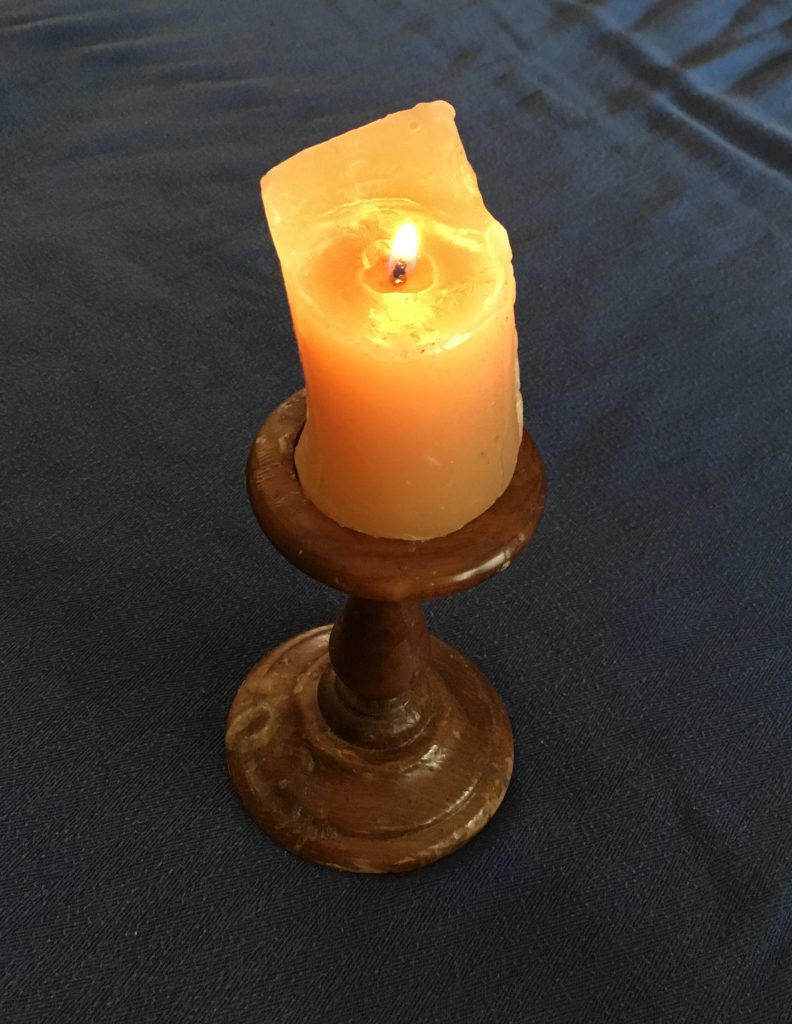How do we ‘experience’ God?
One Sunday morning in college I stood in a worship service in our church in a pew three rows from the back singing the hymn “Spirit of God, Descend upon My Heart.” I wept at the words and the palpable sense of God’s love and favorable presence. I experienced the reality of God. I was moved. My devotion was deepened.
This past April, I returned to that church. I sat in the same pew. We sang similar songs. Similar leaders prayed. We heard the same Bible. But no tears came. No emotional engagement happened. I left unmoved.
So I ask, “How do we ‘experience’ God?”
❦
I had never knowingly seen a monk. The one speaking to us was a bit chubby with short, cropped, slightly graying hair. His white robe underneath it’s black overlay, the signature of the Trappist, showed evident wear, stained in some places, frayed in others. As he spoke to us he betrayed a frequent smile. Though he had chosen a life of seclusion and silence I sensed he cared for people and took joy in speaking.
He introduced himself to us as Father Carlos and spoke to orient us to the week ahead of us at the Abbey of Gethsemani, the Trappist monastery where we were guests. He touched briefly on the rules of silence—where and when we could speak—assuming that it was for the silence that we had come. The monks open their home to guests so that, among other things, guests might through silence and solitude become ‘open to God in a particular way that is not always available in the world today’ as their welcome material puts it.

The Monks’ Church
One might think that pastors don’t need this, that we have a hot-line of openness to God. One would be wrong.
Pastors too easily orient their lives around what they produce for others. I find I’ve nearly forgotten what it is to read something—even Scripture—thinking only of its inherent value for me and my life as a Christian and not of how I might use it for a sermon or lesson or for someone else’s encouragement. I wanted, needed, to be ‘open to God’ in a way not ordinarily available to me. I wanted to experience Him in a fresh way.
To this end I determined to take nothing with me but a Bible and a notebook and to spend the time being engaged with God through his word in a way not otherwise possible. That was a good plan. But it terrified me. What if I bored of that? What if I could not sustain the prolonged biblical reflection? What of the time that would then be wasted? I panicked and shoved a dozen books into my suitcase, just in case, and effectively sabotaging the radical possibilities of my original plan.
I spent the week (silently!) reading and praying and walking. The books were good. The physical rest was real. The time I did spend in the Scriptures was fruitful. And watching men who have dedicated their days to to a routine focused on worship and prayer alerted me to the ways in which I’m enslaved to a world that discounts the importance of such things.
Nevertheless, there was “no angel visitant, no op’ning skies” as the hymn puts it. There was no overwhelming experience of the wonder and love of God.
If that is not found in a monastery, then where? How do we experience God?
❦
It is easy to attach a sense of our ‘experience’ of God to our productivity. If we are doing enough good and working hard enough for Him, then we find it easier to sense his care for us. I know the fallacy of such thinking and I preach a gospel that undermines it. But it is a persistent burden we carry, trying to earn our way to friendship with God. It leaves us hungry, in need of a re-awakening, a revival in our inner being.

They are serious.
I had planned the monastery trip over a year ago because I was hungry for such renewal. But renewal is God’s work, and he did not wait for the monastery to do his work. From January through Easter I had the joy of preaching a dozen sermons
on the death and resurrection of Jesus from Luke 22-24. I cannot measure the impact of those sermons upon those who heard them, but in the one who preached them there was great fruit. Spending time in the presence of these texts stirred in me again an understanding of Jesus as one who loved me beyond measure and as one I long to follow.
This awakening was fed as I hit my post-cruise sabbatical stride, re-reading John Stott’s The Cross of Christ together with unhurried and regular Scripture reading alone and with my wife. The monastery retreat, intended to jump start a renewal process, simply became a part of it.
This is not surprising. Renewal, or some experience of God, ordinarily occurs not in a spectacular fashion, but in the course of faithfully lived lives. We may not know what to do with five days of silence and solitude and worship and prayer (or we MAY know what to do and panic). But the soil out of which real renewal will arise is the daily rhythms of a life faithfully lived. God is not constrained. He is as willing to warm our hearts through our breakfast Bible reading in the towns in which we live as he is willing to do so in the strange confines of a central Kentucky monastery.
For sure, the daily rhythms of a pastor’s life necessarily involve more time in the company of Scripture. If you are not a pastor, your rhythms will not match mine. But what is necessary for all of us is that we build moments into the daily rhythms of our lives that allow room for the Spirit to breathe his breath into us. For me that means certain things, for others different things. It may mean cracking open a few moments of each day or week to place yourself in the presence of God. Perhaps it means making it to church regularly on Sundays. It may mean meditating on Scripture as you walk the dog.
The stepping away from the ordinary rhythms of life, such as Gethsemani afforded me, is necessary if only to assess those rhythms and reset them to make more room for the things of God.
❦
How do we experience God?
Perhaps we expect God to meet us as he met the French mathematician/philosopher/apologist Blaise Pascal who famously had an experience of the presence of God one night which he described simply with the word ‘FIRE’. Maybe he will. But ordinarily he does not.
He met me in the third row from the back in a suburban Michigan church in 1978 when all I had done was get up and do what I normally did – go to church.
Certainly such deep movements of the Spirit in the soul are not for us to orchestrate but for God to give. He will make himself known to the one who waits with patience in the ordinary and faithful living of the Christian life.


 Cribbage, as some of you may know, is a card game whose points are scored by placing pegs in a board with 121 holes for each player. So we opened our board, shuffled the cards, and laid out the instructions. It was quite a bonding moment for Barb and I to realize that given that these were written by a non-native English speaker and printed in 6-point type, we were in no way going to learn to play cribbage.
Cribbage, as some of you may know, is a card game whose points are scored by placing pegs in a board with 121 holes for each player. So we opened our board, shuffled the cards, and laid out the instructions. It was quite a bonding moment for Barb and I to realize that given that these were written by a non-native English speaker and printed in 6-point type, we were in no way going to learn to play cribbage. Grant was, as Twain noted and his biographer (
Grant was, as Twain noted and his biographer (


 practiced there for the past 170 years and around the world for nearly a millennium. For ordinary people like me the Abbey provides a place where one might sample a period of silence and reflection, and so I had come.
practiced there for the past 170 years and around the world for nearly a millennium. For ordinary people like me the Abbey provides a place where one might sample a period of silence and reflection, and so I had come.
 Kevin Collins was a faithful minister of the Gospel, a servant who had given his life (that part not irretrievably captured by his love for the University of Tennessee!) to Christ and his church. As such he had loved and ministered to me and served and strengthened the church I pastor. His kindness was legendary and his pastoral heart irrepressible. I was shaken by this and was reminded how often death steals from us the things, the people, we love.
Kevin Collins was a faithful minister of the Gospel, a servant who had given his life (that part not irretrievably captured by his love for the University of Tennessee!) to Christ and his church. As such he had loved and ministered to me and served and strengthened the church I pastor. His kindness was legendary and his pastoral heart irrepressible. I was shaken by this and was reminded how often death steals from us the things, the people, we love.